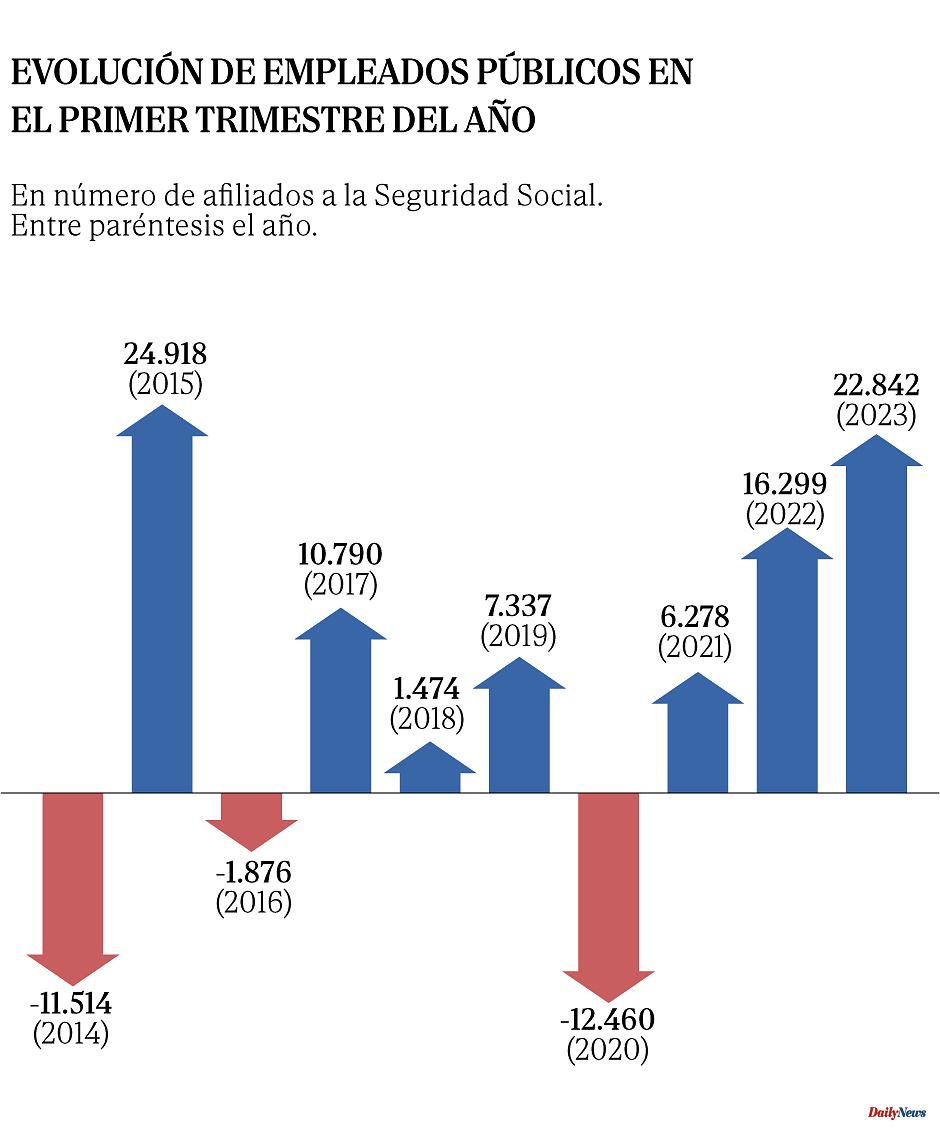Public employment has grown in Spain by 22,842 people in the first quarter of the year, the largest increase in personnel at the service of the Public Administration in this period since 2015, in which regional and general elections were also held in Spain.
According to the updated public employment data at the end of March published yesterday by the Ministry of Social Security, with this increase in personnel, the total number of average affiliates in the public sector stands at 2,903,492 people, a historical record, who would have to add public employees who are not registered with Social Security because they belong to mutuals.
This increase in affiliates between January and March (at the end of December 2022 there were 2,880,650 public employees in the country), has occurred despite the fact that in health, one of the sectors with the greatest personnel deficit and in In which more mobilizations are taking place, personnel have been destroyed.
In the first three months of the year the number of public health workers has fallen by 14,887 members, bringing the total number of employees in health activities to 752,347. According to CSIF, the majority union of civil servants and labor personnel of the Administration, "9,500 Primary Care doctors, 130,000 Nursing professionals, 1,250 midwives, 1,100 pediatricians and 44,000 auxiliaries" are needed in Spain for Spain to reach the average number of health professionals. European Union. They also calculate that "it is necessary to hire 176,000 positions in other categories, such as clinical psychologists, physiotherapists, social workers, or Management and Services personnel throughout the National Health System."
This loss of public employees in this sector has been offset by the reinforcement of other Administration departments, such as Education, where 16,356 employees have been hired in the first quarter -a figure partially distorted by the layoffs that traditionally take place before Christmas holidays-, or the incorporation of 15,166 workers in the Public Administration, Defense and Social Security.
Public contracts in Research and Development follow a long way behind (1,957 new affiliates in the first quarter); waste collection, treatment and disposal (1,632) or technical architecture and engineering services, where 1,294 people have joined. These last two areas are closely linked to the deployment of European funds.
Along with health, the other sector in which there has been a loss of personnel is in Postal and Postal Activities, that is, in the public company Correos where 2,233 affiliates have lost in the quarter -mostly due to retirement not covered-. For this reason and given the imminent peak of work due to the elections, the company has already announced that it will carry out 2,500 reinforcement contracts for the regional and municipal elections on May 28. In addition, this same Sunday the company's entrance tests will take place to cover 7,757 permanent jobs in operational categories throughout Spain.
By administrations, the State has incorporated 3,226 people in the first quarter; the autonomous communities, 12,335, and local corporations, 7,281; and by gender, 10,398 men and 12,443 women have joined in this period, with which the gap increases in favor of the latter: there are 1.73 million public employees in Spain compared to 1.16 million men.
Catalonia is the autonomous community in which more public personnel have been hired in the first quarter of the year, with an increase of 9,138 people (40% of the total number of contracts), most of them (7,097) residing in Barcelona. The bulk of these reinforcements have occurred in the regional administration (8,795) and the local (593), while the number of State troops in that region have dropped by 250 people.
It is followed by the Community of Madrid, with the incorporation of 4,269 people, of which almost half (2,014) are State employees, while 2,189 have been hired by the autonomous community and 65 by the local; Andalusia, with 3,503 new affiliates from the public sector; Castilla-La Mancha, with 3,140 new hires, and Galicia, where 1,798 public employees have joined.
Although these are the regions in which public employment has increased the most, not in all cases has it been the sole responsibility of the regional government. If regional hiring is analyzed, Catalonia leads the classification, followed by the Valencian Community (with 3,245 new public employees hired by the Generalitat) and the Community of Madrid is in third place, with 2,189 new employees in charge of the regional government of Isabel Díaz Ayuso.
There have been, however, regional governments that have dispensed with public personnel, such as the Andalusian (-2,065), the Canarian (-1,578) and the Basque (-882).
According to the criteria of The Trust Project












